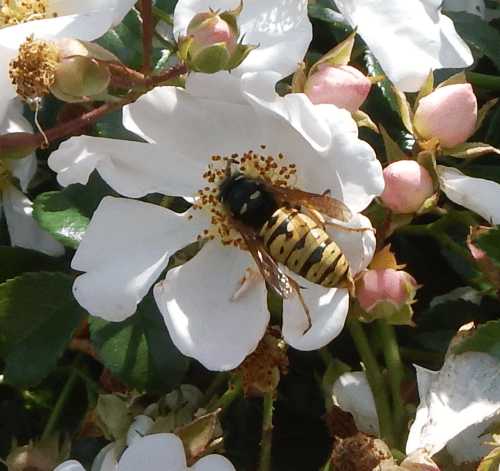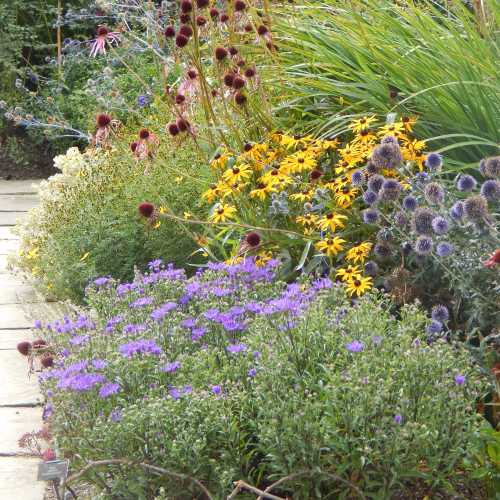Bee Friendly Ant Killer?
- The safe way is to repel ants, don't kill them!
Updated: 26th April 2021
Without a doubt, I find the current concern for bees, doesn't necessarily extend to other insect and invertebrate species!
For this reason, I find that one question I am asked is how to kill insects like wasps and ants, without harming bees, and whether it's possible to purchase a bee friendly ant killer or wasp poison.
My response is this:
repel, rather than kill!
I don't advocate killing ants or wasps, for example, as they each play
their roles in the eco-system. I had ants in most of my raised beds at our allotment. I'll admit they bit my husband.......but not me! Why, I do not know! It seemed I was able to get along with digging etc, without a problem. I love ants anyway, and actually find them amazing to watch! I would also point out that I was far more active on the allotment than my husband was.
Anyway, I'm not so sure it is possible to harm unwanted insects without also hurting beneficial or benign species - at least indirectly.
For example, what happens if a bird eats the recently poisoned and now toxic dead ant or wasp, or feeds them to chicks, let alone inadvertantly killing other invertebrates, including those which dwell in soil?
How To Repel Ants Without Killing Them
Here are some deet-free repellents to deter unwanted insect and invertebrate visitors, rather than using outright poisons. You could try natural substances or ultrasonic gadgets. Believe it or not the 'ultrasonic' insect repellents have great reviews - I even found some with promises of 'lifetime satisfaction guaranteed' or similar!
Disclaimer:
I am a participant in the Amazon Services LLC Associates Program. If you make a purchase through one of my image links I may receive a small commission. This will not affect the purchase price and you will not pay more when you buy through my link, and it helps me fund my site.
No Such Thing As A Bee Friendly Ant Killer....?
I'm not convinced there is any such thing as a bee friendly ant killer, and I would be suspicious of any claim. I suspect that if something kills ants, it has the capacity to kill bees too, as well as other beneficial or benign invertebrates.
Anyway, apart from the fact that ants, bees and wasps are from the insect order hymenoptera and therefore share some common characteristics, there are perfectly good repellents available (although perhaps there is a relatively low level of awareness, and some of these products are relatively new on the market).
I recently received the following query, which provides an excellent example of how easy it is to accidentally harm beneficial insects, whilst trying to target other species such as ants. This person was probably very concerned about the bees, however.
My response was that yes, it’s quite probable that the ant killer has killed the honey bees.
In this case, I suggest the bees were attracted to the sweet molasses, which unfortunately was toxic for them.
“I noticed dying honey bees on top of the ant mound I had placed a molasses based ant killer on.
Do you think the honey bees are
eating the ant killer?"
Bees are attracted to sweet things (this includes other bee species too, such as bumble bees), and honey bees have even been known to feed on sweet output from an M&Ms confectionery factory.
This happened in France, where beekeepers were surprised when their honey bees began producing 'honey' in shades of blue, green, purple and bright yellow.
Further investigation revealed that the bees had been feeding on confectionery intended for humans, actually on M&Ms shells at a factory 2.5 miles away, the waste product of which had
been stored outdoors. The situation was
later rectified with the waste covered by the factory and stored indoors.
In the 'M&Ms case', the bees were not poisoned, but
the sweet substance was found to be stored in the honey combs, meaning that the
product produced was technically not honey, because it was derived from a
non-floral source.
However, this case does prove that bees will adapt and are attracted to sweet sources of food. This also happens in nature, with bees being attracted to honey dew aphid secretions.
It illustrates that it is quite possible that bees will consume poison disguised as sweet food - just as they unfortunately may consume nectar poisoned by neonicotinoids.
Advice
My advice in this situation was to cover the ant nest to prevent bees feeding from it in future, and to use a non-toxic repellent as suggested above.
FREE PDF DOWNLOAD:
Planning And Planting A Bee Friendly Garden
If you found this page helpful or interesting, I'd really be grateful if you would share it with others - if not this page, perhaps another, such as Gardening For Bees.
Thank you so much :) .

